Atlantic Cup Survives Tropical Storm Bonnie
Published on May 29th, 2016
Charleston, SC (May 29, 2016) – Just over 30 hours into the first leg of the Atlantic Cup presented by 11th Hour Racing and the fleet is through the worst of Tropical Storm Bonnie. Overnight last night the teams saw 35+ knots of wind and a very confused sea state, which made for extremely tough conditions and very little sleep.
Spanish team Tales and French team Eärendil have consistently led the fleet and have chosen a more northerly path. While Amhas, Toothface and Oakcliff in the second grouping opted to head further east. Since the wind shifted, teams have seen very fast sailing, with Tales hitting top speeds of 19.6 knots today.
Privateer’s tracker stopped working shortly after the start yesterday, which is why the tracking map shows them in Charleston. However, they are racing and updating their position with race HQ and as of 3:30 ET they were located at 34.05 357 N 75.59 726 W putting them in the vicinity of Talanta on the tracking map.
Liz Shaw, Oakcliff Racing
“Overnight we made a conscious decision to push hard. We were in a little pack of boats and we made a goal to have more sail area than everybody else. For a while it really paid off: by this morning we had shot out in front of our group and were going along nicely. There were a few little squalls coming through so we decided to make a change based on what was expected to happen down the track. We went from our full main with a solent with a reef to a code zero, which is typically a pretty easy maneuver, but we had a few little hiccups — nothing major — but it just took us longer than it should have. We lost some distance but we’re gonna work hard to gain it back.”
Mike Hennessy, Dragon Ocean Racing
“We had a lackadaisical start, we were doing fine to the first mark, but then we screwed up our douse of the code sail, so we were a little bit behind coming out of the channel, but things stabilized after that. The shift came earlier than expected and the reality was we couldn’t really hold course once we got over [onto starboard] but it was still better than continuing east on the headed port tack. The third tack we took came with the big shift around 3am and that allowed us to lay Frying Pan shoals and then Hatteras, which is where we’re on track for right now. We have the code five up, going pretty well. Everybody is safe and doing well.”
Tristan Mouligne on Toothface 2
“We are reaching along approaching Cape Hatteras, we have Amhas in front of us about a mile ahead. We’re sailing side by side. They’ve been a little bit faster than us and they’re very slowly building their lead. So we’re going back and forth a little bit and obviously that’s frustrating for me because those guys are good friends and we have a new boat and would like to be going a little faster!
Last night was tough, it was a rough, rough night but everyone’s fine. We lost our windex off the top of the mast and we lost our man overboard module off the back of the boat and didn’t realize until this morning. The sea state was definitely confused; the waves were coming from all over the place. You’d get to speed going 10, 11, 12 knots and you’d catch a wave that came from right on the bow instead of the wind direction and we would launch off the wave and slam down pretty hard and I’m sure that’s how we got the damage to the top of the mast.”
On board updates from, Pleiad, Dragon, Toothface, Amhas and Privateer can be found here.
——————
North Sails Atlantic Cup Expert, Anderson Reggio, provided a detailed analysis of what to expect and look for in the next 12-18 hours:
The lead 2 boats right now, Tales and Eärendil are just fast. Tales has shown speeds upwards of 19.6 knots. There are still some cells out there that are remnants from this tropical storm, but they are very much into the southerly breeze and whipping along. Most boats are seeing consistent speeds in the teens except the boats that are back, Dragon, Pleiad, Talanta. They are showing slower speeds, which is either a product of them potentially having broken something or they are just outside the latest set of cells that are going past the boats in front of them.
The next 12 hours, boats are going to be making their way around Cape Hatteras. It seems as though the winning strategy right now is staying in closer to shore where you’re getting a little bit better pressure and just sending it to the north. For Amhas and Toothface, the boats that are starting to push themselves offshore to find the Gulf Stream, the speed difference between is so great between them and Tales that I don’t really see the Gulf Stream, at least until they get past Hatteras, being that significant a factor.
What’s happening is that reports of pressure are stronger in and along the coast than they are offshore. Essentially the storm pushing in from offshore is doing more of a pressing against the shore, so along the shoreline you have 17-20 knots and offshore more in the 15-16 knot range. It’s hit or miss that’s the biggest thing about this, if you look at a satellite picture or radar image you’ll see banding activity in the showers which means it’s probably a banding activity in the cloud formation the teams are seeing as well so they’re basically hopping from one cell to the next. On the leading edge they get a big outflow of pressure, underneath them they get a big softening of pressure and then behind them it can be quite light and variable for a little while until the gradient starts to fill back in.
Looking ahead, it’s definitely a no lead is safe scenario because after they get around Hatteras then the Gulf Stream is definitely going to be a priority. and they’ll be around Hatteras in the next few hours, and then the gulf stream is going to be much more of a priority especially because it will get significantly lighter as they get further north during the day on Monday and even into early Tuesday.
The models, as far as how to set yourself up on how to come into the finish are a bit variable so if I were on board right now I wouldn’t be planning my entrance into New York, because it’s just not clear yet. I expect the leaders to hedge their bets a bit after they get around Hatteras to push offshore to get more into the stream to put themselves more between the competition and the goal post. I’d expect Toothface and Amhas to want to be the furthest east east and hit the gulf stream first. Oakcliff’s strategy isn’t quite clear yet they seem to have gone east for a while and now seem to be taking a more northerly route and for the last three they seem to be unfortunately shot out the back pretty quickly.
——————
Event website – Tracker – Facebook
About The Atlantic Cup
The Atlantic Cup presented by 11th Hour Racing is, at 1,045 nautical miles, the longest offshore in the Western Atlantic. The Atlantic Cup was created and is owned by Manuka Sports Event Management. It started in 2011 as a concept event and grew to a multi-stage race. Since its inception, the Atlantic Cup has aimed to be the most environmentally responsible sailing race in the United States. The race is sailed solely in Class40s, a monohull race boat designed for shorthanded racing.
The first doublehanded leg starting May 28 takes the fleet 648 nm from Charleston, SC to Brooklyn, NY, with the second doublehanded leg starting June 4 for 360 nm to Portland, ME. The final stage on June 10-11 will have 6-person teams complete an inshore series of races in Portland.
The Atlantic Cup ran annually in May from 2011 through 2014. After 2014, the race moved to a biennial event. The course in 2011 was a sprint from New York to Newport with an inshore series in Newport. From 2012-2014, the race was a three-stage event that started in Charleston, South Carolina included a stop-over in New York City and finished in Newport, Rhode Island. In 2016, the Atlantic Cup will continue to comprise of three legs, with stop-overs in Charleston, S.C., Brooklyn, N.Y., and for the first time, Portland, Maine.
Source: Atlantic Cup


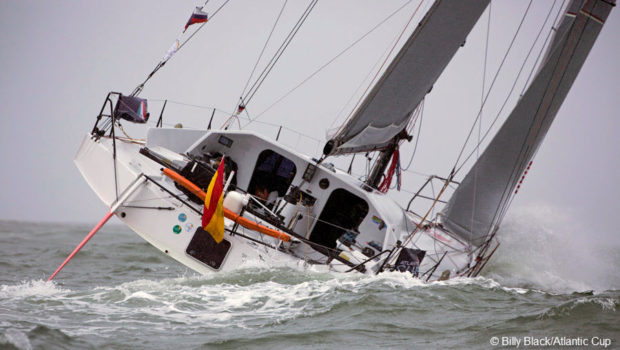


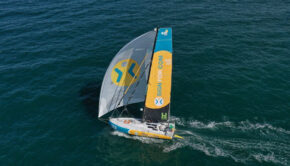
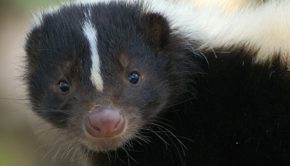
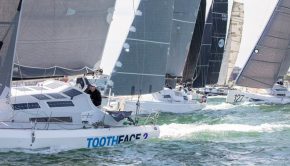
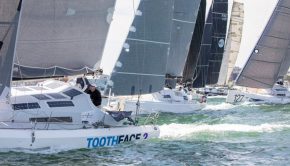
 We’ll keep your information safe.
We’ll keep your information safe.